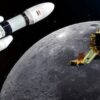Rocket Lab achieved a significant milestone on August 23rd by successfully reusing an engine during an Electron launch, marking a significant step forward in their pursuit of reusing the entire rocket booster.
The launch took place at 7:45 p.m. Eastern from Rocket Lab’s Launch Complex 1 in New Zealand. Dubbed the “We Love the Nightlife” mission, it deployed a Capella Space radar imaging satellite into a mid-inclination orbit of 640 kilometers approximately 58 minutes after liftoff.
Originally scheduled for July 30th, the launch had to be postponed due to data indicating low igniter pressure from a sensor in one of the engines. A subsequent attempt on August 6th also had to be scrubbed.
In response, Rocket Lab made the decision to switch out the entire booster with a newly completed one designed for recovery, which allowed them to expedite the process of getting back to the launch pad for the Capella mission. Murielle Baker, a spokesperson for Rocket Lab, explained during the launch webcast that this move was aimed at achieving reusability for the Electron rocket.
The newly utilized booster was not only optimized for reuse but also featured one of the nine Rutherford engines that had previously been part of an Electron launch back in May 2022. This engine had undergone rigorous testing to ensure its suitability for flight once more.
After the successful launch, Peter Beck, the CEO of Rocket Lab, took to Twitter to express his satisfaction with the reused engine’s performance. During an earnings call on August 8th, Beck indicated that reusing a Rutherford engine was among the final steps before the company could attempt reusing an entire booster. He mentioned that the first reflight of a full-stage booster would be scheduled thereafter, with further enhancements for reusability planned for the 45th vehicle flight.
This particular launch was the 40th for the Electron rocket and marked the commencement of Capella’s Acadia line of synthetic aperture radar imaging satellites. Rocket Lab had previously entered into a contract with Capella Space in February to deploy multiple Acadia satellites through Electron missions.
The successful launch also kicked off a series of four Electron missions carrying Acadia satellites, though specific scheduling details were not disclosed. Rocket Lab’s ambitious plans for 2023 include 15 Electron launches, as revealed in the earnings call.
In a video during the launch webcast, Beck expressed his amazement at reaching the 40th flight milestone, reminiscing about the early days of the program and expressing his anticipation for the missions ahead. The inaugural Electron launch had taken place in May 2017, and Beck looked forward to continuing the company’s progress beyond this achievement.
Disclaimer: The views, suggestions, and opinions expressed here are the sole responsibility of the experts. No Digest Pulse journalist was involved in the writing and production of this article.




